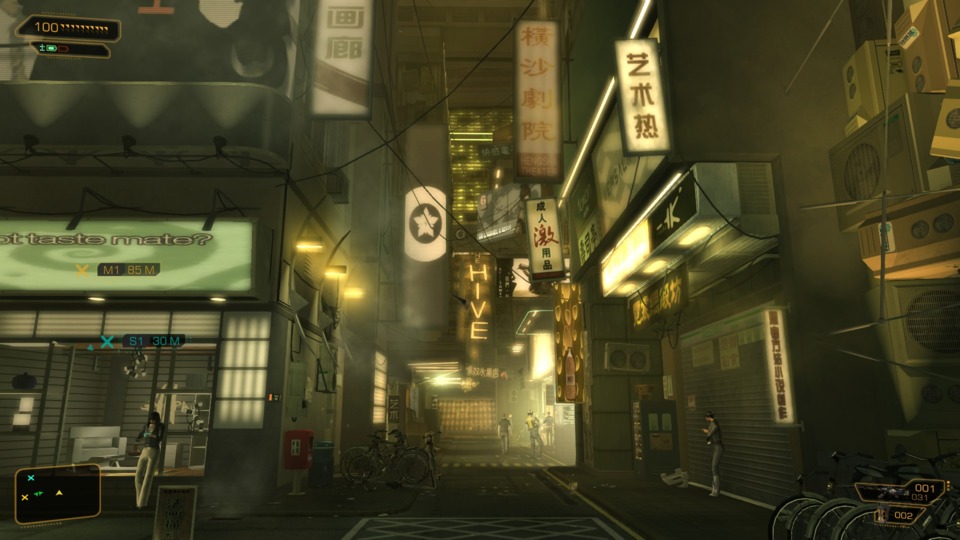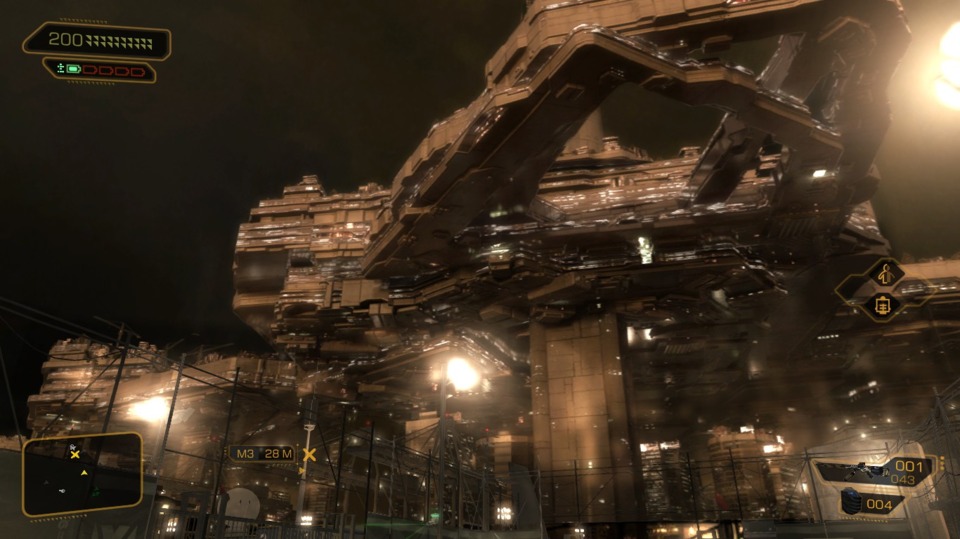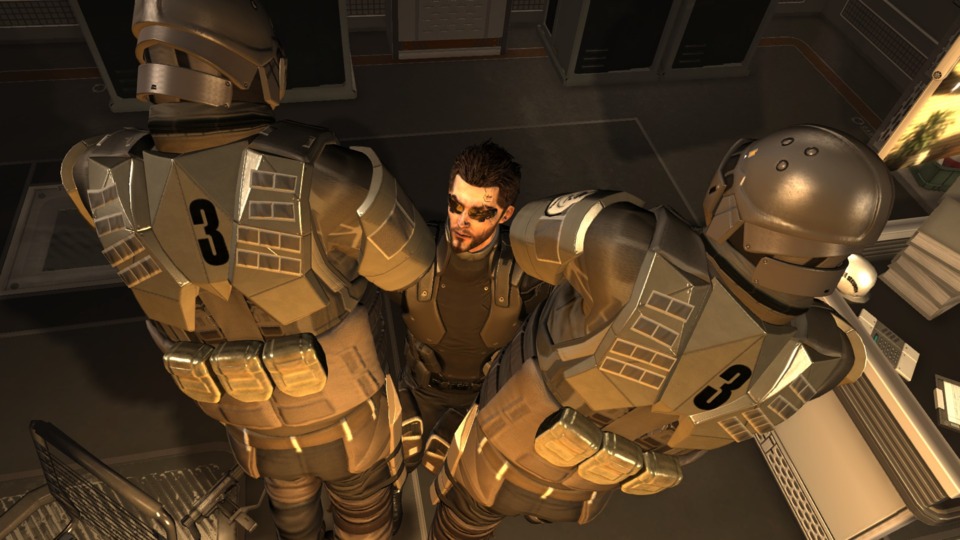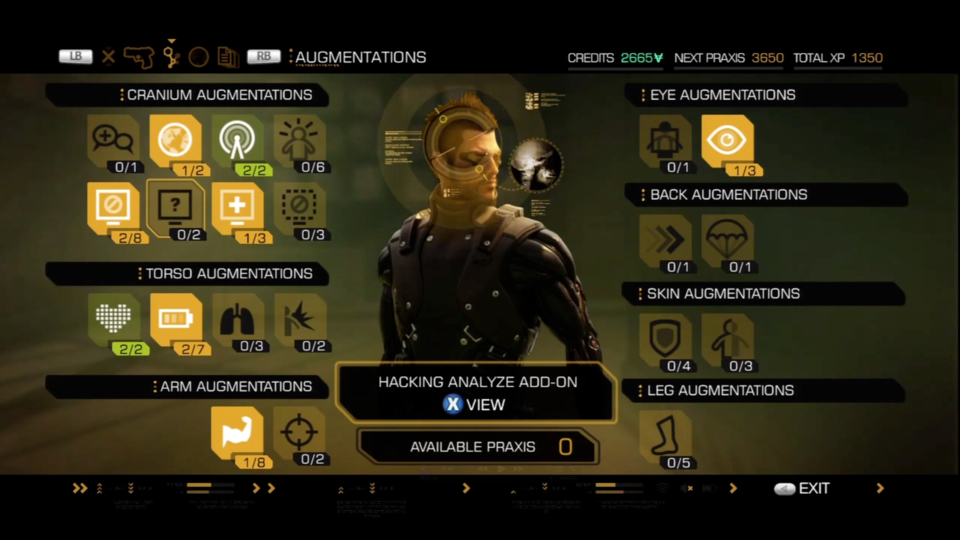Not a Rollercoaster, but a Theme Park
Despite Deus Ex: Human Revolution’s setting being in the future, the game itself doesn’t even feel like a modern shooter. It incentivizes exploration, which modern shooters were weaned from long ago, and features the kind of sci-fi story that languished after Neuromancer and Blade-Runner came out. At the same time, Eidos Montreal has taken several contemporary concepts and blended them with the old. It is a weird mix, and as a result Human Revolution has the look and feel of a mainstream shooter, but the experimental options of a game from the early 90s. It is among the few games in recent history actually trusts you to find every nook and cranny of its world, and then goes another step by doling out plenty of rewards for it.
That being said, Human Revolution’s open nature results in some technical instability, bugs, and some general rough edges. Because you are allowed to exercise so many different play styles and navigate incredibly complex levels, the game tends to break every once in a while. But when everything gels and the game doesn’t unleash its plethora of glitches, Deus Ex showcases a world that is more theme park than roller coaster, and is worth seeing to the end.

Human Revolution starts promising with a story premise that sets the stage well for the entire duration of the 15-20 hour narrative. The year is 2029—a time that, barring any accidents or diseases, I will live to see—and cynicism seems to have blown through the roof. An oil crisis fourteen years prior almost crippled the United States, and the future now rests on cyber-prosthetic augmentation. This new technology, which isn’t just on par with nature, but superior to it, obviously rouses some controversy. Pro-human protests are growing tenser by the day, as regular citizens start to feel pushed out by the super strength, speed, and brainpower of augments. The pro-augment corporations toe the ethical line well, but much is left to the player to decide. In fact, Human Revolution never tells you outright which side is correct. Both sides take morally ambiguous actions, and both give good arguments for their causes. Again, Human Revolution is a game that gives you the information and tools and lets you decide what you think and how you’ll act.
It is in this volatile environment that Adam Jensen, head of security for the augmentation pioneer Sarif Industries, finds himself unwillingly thrust into. A mercenary attack upon the Detroit based company, just before an important unveiling of groundbreaking research leaves lead scientist Megan Reed (and Adam’s squeeze) presumably dead, Adam nearly so, and all research burned. In order to keep Adam alive, David Sarif (big boss of Sarif Industries, and Spicoli sound-alike) orders him to be outfitted with top of the line augments. Adam sets out with his new shiny arms, legs, and brain implants to find who was responsible for the attack, and unravels a sci-fi mystery straight out of the early 80s.

Though the premise is really engaging, the execution throughout isn’t as consistent. There were several moments where I wasn’t really sure why I was doing certain objectives. Deus Ex communicates much of its story through in-game books and computer terminals, most of which can be missed entirely. There are also some cut scenes that don’t particularly do much to explain certain occurrences, and don’t look crisp or animate well. Add in a confounding late game Illuminati conspiracy twist that doesn’t feel appropriate and doesn’t wrap up nicely, and Deus Ex starts to feel a little jumbled.
Despite the occasional confusion, the visual style of Human Revolution goes a long way to making this vision of the future interesting. The color palette is fairly restricted to deep gold and black, but works well with the neo-renaissance design aesthetic. The art team at Eidos Montreal obviously took inspiration from 16 century artists, notably Rembrandt (whose Anatomy Lesson of Dr. Nicolaes Tulp makes an appearance in-game). Chiaroscuro seeps into the hard shadows on character faces, lean cyber-musculature looks appropriately dense and strong, and the cutting, geometrical lines of downtown Detroit and Hengsha, China all form a cohesive style that is unique.
Despite the obvious amount of work put into the aesthetic styling of Deus Ex, the technical side of the presentation drags the art down. On the Xbox 360, the game simply doesn’t run that smooth or look particularly great. The frame rate bogs down for seemingly no reason, load times are lengthy, and character faces and animations are lacking in quality. By the end of my play through, what I took away from Deus Ex’s visuals definitely wasn’t the technical fidelity, but the art that still manages to eke past the ugly.

Though the graphics and story have inconsistencies, actually playing as an augmented espionage agent (or killer depending on your play style) compensates for most issues. Jensen’s augments can be unlocked by earning “Praxis points” through experience leveling (read: skill points). Every 5000-experience points nets you one Praxis, and the first unlock of any augment class costs two. After you unlock a class of abilities on the skill tree, you then only need one Praxis. Augments vary wildly, giving you choices such as physical abilities like jump height and the ability to punch through walls, stealth invisibility cloaks and footstep sound suppressants, computer hacking buffs, and more shooter oriented powers such as armor and marksmanship. Each augment serves a particular purpose, and you can’t (yes, you really can’t) change your mind once you choose. This gives a weight to each decision on how to allocate points, and definitely made me think about the advantages and disadvantages of each augment carefully.
This goes for the melee system as well. Takedowns come in two flavors: lethal and non-lethal. Both take up one of Jensen’s disposable battery meters, which can be upgraded to recharge faster or expand to allow more active augment usage. Only the first notch of the meter can recharge though, so unless you have energy candy bars (read: mana potions) you’ll either have to use a weapon, or wait to recharge. Again, this is another example of Human Revolution giving you a choice and forcing you to make a decision, even if it is on a small level.
Choices then have a certain tendency to lock your play style in place for the entirety of the game. If you start as a stealthy corporate agent, buffed out with invisibility and non-lethal weapons, you’ll likely stay that way since you won’t be able to repurpose any of your augmentations. The same goes for those who will choose blunt force, though there are many more experience bonuses for finding hidden air ducts and roundabouts than there are shooting bonuses. Compounded by a definite sluggishness in aiming and Jensen’s inability to take more than a few bullets to the chest, and the gunplay in Human Revolution starts to feel like it isn’t as viable an option as stealth. It is feasible, but I found that a mix of predominant stealth and occasional gunplay (mostly when I messed up and alarmed a group of guards) was the most satisfying way to play.

One thing that I must say is necessary is hacking proficiency. The hacking mini-game in Human Revolution is a timed node-capture affair that is simple and nets large amounts of experience for success. You can technically blow open most hackable doors in the game with explosives (subsequently alarming everyone within a five-mile radius) but there are dozens of computer email accounts and safes that can only be accessed by hacking. And since most of the story details are communicated through in game writing, hacking and finding new expository notes and scripts becomes pretty important.
Conversation dialogue also is an important way of initiating, and even swaying story events, and Human Revolution takes a unique approach when it comes to talking the talk. Instead of responses being strictly good, bad, or neutral, there is a mix, and most situations won’t be clear-cut morality lessons. This makes Human Revolution feel much more complex than, say, Mass Effect 2. Investing in an augment that makes persuasion and coercion easier is also an ability that I heartily recommend to anyone who wants more side-quest opportunities, or a more direct hand in story happenings.
One surprising feature of Human Revolution’s game world is that side-quests, and even some main missions can be completed before they have been officially bestowed upon you. This meant that at several different times you could end up visiting an area once and complete several objectives you didn’t even have in your mission log, circumventing future visits to that area. This happened at least twice during my time with Human Revolution, and it is a great showing of developer-player confidence by Eidos to include it.
I briefly mentioned the game’s tendency to break down, and that claim bears more explanation. Human Revolution is a fairly large open world—akin to Batman Arkham Asylum’s world albeit with more options—and most areas have interweaving air ducts, alternate pathways, and dozens of game agents walking about. This leads to some pretty bewildering bugs, particularly concerning non-lethal kills. Occasionally, shooting an enemy with pacifying weapons or a non-lethal (but definitely rib shattering) takedown would actually kill them instead of knock them out. I also encountered a situation where a guard slumped onto a wall after I smacked him, and he actually died when he touched the wall! I don’t know if this was an issue with bodies touching certain geometry, or if the complexities of the game world were too much, but it definitely was annoying. I also found that sometimes guards would turn hostile when I stepped over an ill-defined hostile zone. Notably, during a police station infiltration, which resulted in 20 to 30 armed lawmen turning on me at once.
Human Revolution can be a frustrating game, and there are flaws permeating nearly every aspect of it, but there are simply too few games approaching choice and play options to discount it based upon the issues. If you’re up for a lengthy excursion into the augmented reality of a future that presents itself as a harkening back to 80s sci-fi, then Deus Ex will delight. If you like your games fast, focused, and frenzied, rather than methodical, open, and trusting, which is perfectly fine, then it might not be for you.

0 Comments